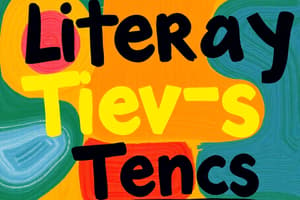Podcast
Questions and Answers
A written conversation between characters is called ______.
A written conversation between characters is called ______.
dialogue
The thoughts of the narrator, not put in quotation marks, are referred to as ______.
The thoughts of the narrator, not put in quotation marks, are referred to as ______.
internal thinking
The use of clues that hint at future events in a story is known as ______.
The use of clues that hint at future events in a story is known as ______.
foreshadowing
A word or phrase that appeals to one or more of the five senses is called ______.
A word or phrase that appeals to one or more of the five senses is called ______.
The high point of interest or suspense in a story is referred to as the ______.
The high point of interest or suspense in a story is referred to as the ______.
The conclusion or end of a story, where the conflict is resolved, is known as the ______.
The conclusion or end of a story, where the conflict is resolved, is known as the ______.
The sequence of events involving characters and conflict is called the ______.
The sequence of events involving characters and conflict is called the ______.
The underlying message or point that the author is trying to convey is referred to as the ______.
The underlying message or point that the author is trying to convey is referred to as the ______.
Flashcards
Dialogue
Dialogue
Written conversation between characters.
Internal Thinking
Internal Thinking
Narrator's thoughts, not in quotes.
Foreshadowing
Foreshadowing
Clues hinting at future events.
Imagery
Imagery
Signup and view all the flashcards
Plot
Plot
Signup and view all the flashcards
Climax (Turning Point)
Climax (Turning Point)
Signup and view all the flashcards
Resolution
Resolution
Signup and view all the flashcards
Exposition
Exposition
Signup and view all the flashcards
Study Notes
Literary Terms
- Dialogue: Written conversation between characters, typically in quotation marks.
- Internal Thinking: The narrator's thoughts, not in quotation marks.
- Foreshadowing: Hints or clues suggesting future events.
- Imagery: Language appealing to the senses (sight, touch, taste, feel, hear).
- Climax: The most exciting or suspenseful point in a story.
- Resolution: The conclusion or end of a conflict.
- Plot: The sequence of events in a story, involving characters and conflict.
- Exposition: Introduces background information for readers.
- Suspense: A feeling of anxious uncertainty about the outcome.
- Theme: The underlying message or point of a story.
- Character Traits: Qualities that describe a character's personality.
Studying That Suits You
Use AI to generate personalized quizzes and flashcards to suit your learning preferences.




